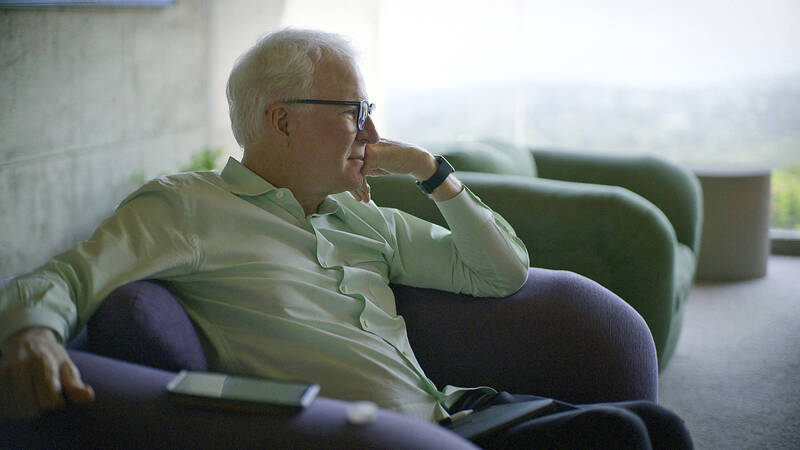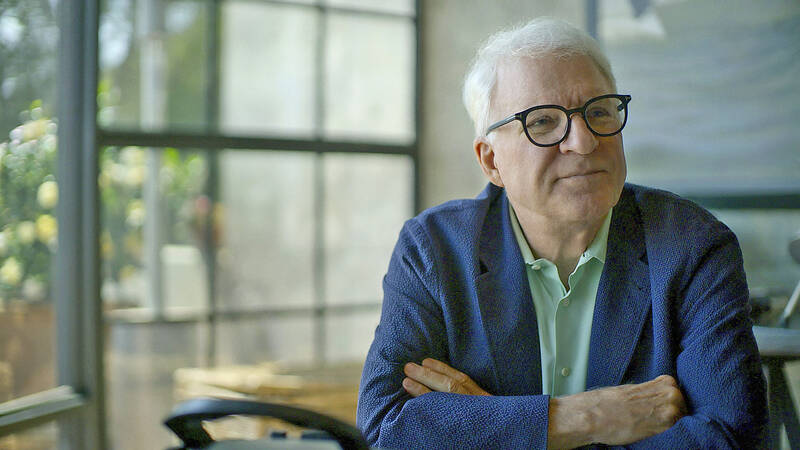Steve Martin has never been one to follow any sort of playbook. It is fitting the first official documentary about his life is similarly unconventional: A freewheeling story told in two parts, one part focused on “Then” and one part focused on “Now” (kind of) with both parts debuting on Apple TV+ today. Both documentarian and subject are trying, the best they can, to make sense of whatever “Steve Martin” is.
Directed by self-proclaimed superfan Morgan Neville (the Oscar-winner who has told the story of Fred Rogers and Anthony Bourdain), STEVE! (martin) never commits to one form. Like its subject, it allows itself to be a little looser, utilizing every technique available to help paint a truer picture of Martin, a man so enigmatic that his close friends don’t even seem to have a handle on him. He’d hardly be the first performer to save it all for the stage: Martin says that it was somewhat comforting to be able to put on a persona during shows. He was also able to continually reinvent himself. Who else could have walked away from stand-up just as they’d reached rock star status?
HOLLYWOOD ROLLERCOASTER

Photo: Apple TV+ via AP
And so the medium becomes a kitchen sink: There is stock footage, animation, reenactment, home videos, movie clips, stand-up segments, talk show appearances, new interviews with famous friends (Martin and Jerry Seinfeld in conversation, for example), scripted voiceover and some fly-on-the-wall footage of him just spending time with Martin (Marty) Short bike riding, walking through town, playing cards and workshopping jokes for their show. It’s probably the only way to capture an artist who has taken the hyphenate to absurd levels: Magician/balloon artist/novelist/banjo player/screenwriter/essayist/art collector/joke teller/cartoonist/movie star/father/husband/friend. What am I missing?
For anyone who’s read Martin’s memoir Born Standing Up, Then might not be especially revelatory, but it’s all context and it remains interesting to hear Martin reflect candidly on a moment that now feels “like a blip.” While he might not have had a plan, he did possess a keen sense of when he’d hit a dead end, whether that be in magic, stand-up or even movies.
His life in movies is saved for Now, and you see someone still struggling with the agony of never really knowing if a thing would work. Everyone misses once in a while, but Martin had a brutal back-to-back of a wild success in The Jerk followed by an epic flop in Pennies From Heaven and that was just the start of his rollercoaster in Hollywood. He’s kind of moved on from that (and Mixed Nuts) but also kind of not. He said he had to do 40 movies to get five good ones. He’s being a little sarcastic, but hopefully he knows that a lot of people out there love far more than a measly five Steve Martin movies.

Photo: Apple TV+ via AP
It is especially fascinating to get a glimpse into his complex relationship with critics and how he found an outlet in writing both fiction and non-fiction. Personally, I wish even more time had been spent on the movies and his writings, like Shopgirl. Everyone is bound to have a favorite that this doesn’t cover enough.
AN OPEN ENIGMA
If you want to keep Steve Martin in your mind as that wild and crazy guy, or George Banks or Navin or Lucky Day (the list could go on), and don’t care about his relationship with his father, his decision to become a father late in life, reflections on his art collection, the memorabilia he kept over the years and the things he didn’t do that he wishes he did, these films might not be for you. There are no rules to being a fan. For some, biography can mean everything. For others, it matters little when there’s so much joy to be had without it.
Martin, who has been both an open book in some ways and also guarded in others, is really quite vulnerable here — especially in Now. Neville captures him looking at the script for Planes, Trains and Automobiles and reflecting on his late friend and co-star John Candy. There was a great monologue, he said, in which Candy’s Del Griffith tells the story of his life. Martin recalled bawling off camera as Candy delivered it. And yet for whatever reason, it was chopped down to a line or two. He reads a bit of it and starts to cry.
There’s more, but if that sounds intriguing, you should really just watch it. Neville has said it doesn’t matter which order. And what does it add up to? On a certain level he’s still an enigma. It’s hard for mere mortals to comprehend a half century of otherworldly fame, but it’s also just nice to watch a familiar face reflect on how he has, at 78, finally found happiness. Besides, Steve Martin’s story is not even remotely finished. These are just two parts.
STEVE! (martin) a Documentary in 2 Pieces is an Apple TV+ release, streaming from today. Then is 98 minutes. Now is 95 minutes.

On April 26, The Lancet published a letter from two doctors at Taichung-based China Medical University Hospital (CMUH) warning that “Taiwan’s Health Care System is on the Brink of Collapse.” The authors said that “Years of policy inaction and mismanagement of resources have led to the National Health Insurance system operating under unsustainable conditions.” The pushback was immediate. Errors in the paper were quickly identified and publicized, to discredit the authors (the hospital apologized). CNA reported that CMUH said the letter described Taiwan in 2021 as having 62 nurses per 10,000 people, when the correct number was 78 nurses per 10,000

As we live longer, our risk of cognitive impairment is increasing. How can we delay the onset of symptoms? Do we have to give up every indulgence or can small changes make a difference? We asked neurologists for tips on how to keep our brains healthy for life. TAKE CARE OF YOUR HEALTH “All of the sensible things that apply to bodily health apply to brain health,” says Suzanne O’Sullivan, a consultant in neurology at the National Hospital for Neurology and Neurosurgery in London, and the author of The Age of Diagnosis. “When you’re 20, you can get away with absolute

May 5 to May 11 What started out as friction between Taiwanese students at Taichung First High School and a Japanese head cook escalated dramatically over the first two weeks of May 1927. It began on April 30 when the cook’s wife knew that lotus starch used in that night’s dinner had rat feces in it, but failed to inform staff until the meal was already prepared. The students believed that her silence was intentional, and filed a complaint. The school’s Japanese administrators sided with the cook’s family, dismissing the students as troublemakers and clamping down on their freedoms — with

As Donald Trump’s executive order in March led to the shuttering of Voice of America (VOA) — the global broadcaster whose roots date back to the fight against Nazi propaganda — he quickly attracted support from figures not used to aligning themselves with any US administration. Trump had ordered the US Agency for Global Media, the federal agency that funds VOA and other groups promoting independent journalism overseas, to be “eliminated to the maximum extent consistent with applicable law.” The decision suddenly halted programming in 49 languages to more than 425 million people. In Moscow, Margarita Simonyan, the hardline editor-in-chief of the